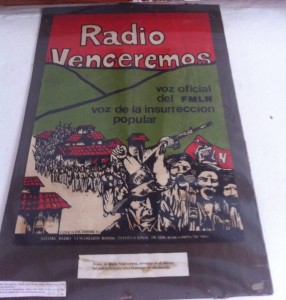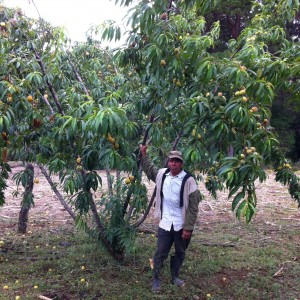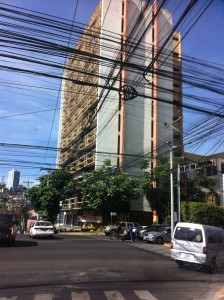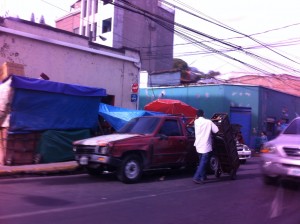Archive for category Tayna Martins
Smile and maybe tomorrow…
Posted by Tayná Morais in Tayna Martins on July 20, 2015
Being back home in the past days, I already started to feel nostalgic about the amazing experience as a Peacebuilder Fellow in Honduras. I learned so many enriching things for my professional and personal life during my time there.
One thing that fascinated me is how the country with the most violent city in the world, San Pedro Sula, is also the same country with villages like Santa Ana and Florida, where everyone seems to be willing to help you even if the only thing they have to offer is a smile. Florida is one of the poorest villages in Honduras, but still incredible rich when it comes to hospitality and kindness. In one of the visits there, we had lunch at the public library, a modest one, but the fact it exists is already a triumph for education. There was a little sign with a poem saying “No tengo todo calculado, ni mi vida resuelta. Solo tengo una sonrisa y espero una de vuelta” (I don’t have everything calculated, nor my life solved. I only have a smile and expect one in return). And that is what I feel right now. I don´t know what is going to happen next, what job and place I will be this time next year, but I will always have the amazing memories of Honduras, where people, even in the most critical life conditions, are always there to give you a smile in the belief that, despite the obstacles, “you’ll see the sun come shining through for you” (Smile, Charlie Chaplin).
´Venceremos´
Posted by Tayná Morais in Tayna Martins on July 3, 2015
Latin America still faces the negative effects of a culture permeated by machismo. From catcalling to domestic violence, women suffer daily abuses across the region.
While in Belgium it is a criminal offence to insult a person based on gender or to make intimidating sexual remarks in the street, in La Espranza, the village where we spent most of our time, not a day goes by without cat calling on our way to the supermarket or to restaurants. The police would definitely have a hard time to handle all the cases if catcalling was illegal in Honduras. Furthermore, talking to the judge of Santa Ana, a municipality in the department of La Paz, one of our case studies, I learned that domestic violence is the most common offense there.
Having said that, it is noteworthy that many of the stories and situations I’ve experienced during my experience here, raised my hopes for a more equal world. For instance, in the department of La Paz, one of the poorest in Honduras, women hold very important positions. I met female mayors and in the local NGO, ASOMAINCUPACO, a network of water committees, highly important for the water governance in the region, the president and the treasurer are women.
 This week, we crossed the border to have a meeting in Perquín, El Salvador. Even though it was a short trip, we got the opportunity to visit the Museum of the Revolution. It is one of the most modest museums I’ve visited, yet one of the most interesting. The Museum contains information on the antecedents and events of the Salvadoran Civil War (1980-1992). It is located in Perquín, because the area was dominated by the Farabundo Martí National Liberation Front (FMLN), formed as an umbrella group of 5 Salvadoran guerrillas. The impressive role of women was also something that caught my attention during the visit. There were many pictures of female Salvadoran human rights defenders murdered during the war. Many women joined the guerrillas during the war, from cooks to snipers, women were crucial in the resistance movement. Women were even commanders, like the commander Ana Maria of the Fuerzas Populares de la Liberación (FPL), and the commander Luisa, responsible for the FMLN’s radio network, Radio Venceremos.
This week, we crossed the border to have a meeting in Perquín, El Salvador. Even though it was a short trip, we got the opportunity to visit the Museum of the Revolution. It is one of the most modest museums I’ve visited, yet one of the most interesting. The Museum contains information on the antecedents and events of the Salvadoran Civil War (1980-1992). It is located in Perquín, because the area was dominated by the Farabundo Martí National Liberation Front (FMLN), formed as an umbrella group of 5 Salvadoran guerrillas. The impressive role of women was also something that caught my attention during the visit. There were many pictures of female Salvadoran human rights defenders murdered during the war. Many women joined the guerrillas during the war, from cooks to snipers, women were crucial in the resistance movement. Women were even commanders, like the commander Ana Maria of the Fuerzas Populares de la Liberación (FPL), and the commander Luisa, responsible for the FMLN’s radio network, Radio Venceremos.
The Museum guide, a former guerrilla member, said that the participation of women in the FMLN guerrilla was really important for fostering the gender equality in the region after the war. Even more impressive was his acknowledgement that violence is never the solution. He highlighted that the Museum is really important for other generations to learn with the past and to not commit the same mistakes. He said that the war created social and family disruption, brothers fighting in different sides, and at the end, the ones who gained from the war, were the arms industry, which profited a lot from the war.
This change of mindset of a former guerrilla member made me hopeful for a more peaceful world. However, we will only win, venceremos, if everyone is take into account, gender equality is indispensable for achieving peace.
A gunshot to takeaway, please
Posted by Tayná Morais in Tayna Martins on June 27, 2015
This post is about one of the things I like the most here, Honduran food. Since we got to La Esperanza, our daily menu is quite limited, but still pretty good.
At the house/office we have lived, we always have eggs, mango, avocado, pancakes, tortilla and beans, and this is the list of the ingredients of all our meals. We usually start our day with a cup of coffee, made with coffee produced by one of the CRS’s staff. For the first time in my life, I can directly say to the farmer how amazing is the coffee’s smell; way better than choosing a random coffee in supermarket’s shelves. At breakfast, we eat mango with pancake or eggs. Sometimes we can enjoy it with the lovely company of some cows having the lawn for breakfast.

For me, the best part is that we often have one meal out and I usually order the same, the typical Honduran dish called baleada. Before coming to Honduras, I searched for the Honduran gastronomy. Last year the World Cup took place in Brazil and many blogs wrote about the culture and cuisine of the different participating countries, including Honduras. In one blog there was an entry about the difference in the culinary of Honduras and Switzerland, as they were playing in the same group. Living in Switzerland and having Honduras as my next destiny, I was curious and began to read the article. The person who wrote the blog instead of using the original name “baleadas” translated the traditional Honduran dish to Portuguese as “tiros” which the translation to English is gunshots. I showed that to a friend of mine like “oh, I am going to a dangerous country where even food names allude to violence”.
Since the first time I tried baleadas, in my first breakfast in Honduras, I fell in love with it. I can have baleadas almost every day and always enjoy the taste of beans, with eggs, avocado and sour cream involved in flour tortilla. It became part of my list of favorite food.
Yesterday, a woman told me the legend of the name baleadas. According to it, an old lady in the Honduran North Coast used to sell flour tortilla to the rural workers. One day she was shot, but survived. From that moment on, the workers started to say “vamos a la baleada” (let’s go to the one who was shot). And that’s why the name of the dish became baleadas.
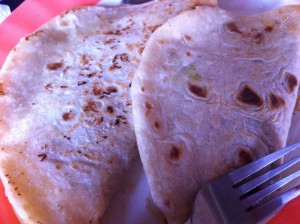 Honduran people eat baleadas, as well as other dishes like tacos and enchiladas, without cutlery. At first, I really suffered to eat with my hands. The good thing is that the Hondurans are so friendly and hospitable that in the restaurant we normally go to, realizing my inability to eat with my hands, they started to always serve my baleadas with cutlery. Hopefully, by the end of my experience here, I will be as skillful as the Hondurans when it comes to eating without cutlery, only using tortillas to grab food.
Honduran people eat baleadas, as well as other dishes like tacos and enchiladas, without cutlery. At first, I really suffered to eat with my hands. The good thing is that the Hondurans are so friendly and hospitable that in the restaurant we normally go to, realizing my inability to eat with my hands, they started to always serve my baleadas with cutlery. Hopefully, by the end of my experience here, I will be as skillful as the Hondurans when it comes to eating without cutlery, only using tortillas to grab food.
A highway or a rally track?
Posted by Tayná Morais in Tayna Martins on June 20, 2015
Since we got to Honduras, the news has been permeated with corruption scandals. Many politicians are reportedly involved, including the Honduran president, Juan Orlando Hernández. Likewise, in Brazil, corruption is a everyday news, unfortunately, despite the increasingly awareness and vocal protests, citizens tend to forget the name of the politicians engaged in criminal schemes when it comes the time to vote. Therefore, along with sharing positive aspects of Brazilian characters, like the hospitality, Hondurans also face the bad effects of a corrupt government.
I saw with my own eyes and felt with my shaking spine the harmful consequence of the Honduran corruption. This week, for the fourth time, we had to cross the road that links La Esperanza, where we live, to Marcala, a city on the way of one of our case studies. It is an unpleasant experience. The highway was left unfinished due to embezzlement. It is in such a bad state that when we were crossing it, there was even a jammed car in the mud formed after a rainy day. It feels like you are in a rally track.
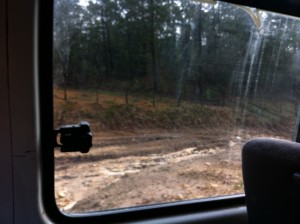
Whereas, the road connecting La Esperanza to a city called Gracias is a well-made and preserved highway. Gracias is a touristic city with thermal waters. However, the disparity between the qualities of the road La Esperanza-Marcala to the one of La Esperanza-Marcala is not a result of a better touristic potential. Rather, Gracias is the city where the president was born and therefore has been the object of constant infrastructural improvements. Whereas, the road to Marcala will probably remain unfinished as the money originally designated to the building of the highway is in politicians’ pockets, while they probably enjoy a good time traveling in foreign countries in nicely paved highways.
“Grassmeetings”
Posted by Tayná Morais in Tayna Martins on June 14, 2015
Pardon my neologism, but after attending some meetings organized by Honduran grassroots groups, I had to write about the “grassmeetings”. The name already gives you some clue of what I will talk about.
Our second field trip was to Florida, La Paz. As soon as we get there we headed to a meeting in a coffee farm. However, my understanding of what a meeting means was definitely limited. I participated in many meetings throughout my studies and professional experiences, but none was like the ones in La Paz. I am used to meetings in an office or meeting room, where everyone has at least a chair and a place to comfortably write their notes. If you are talking about a specific issue or place there will probably be a PowerPoint or Prezi presentation with pictures about it. That was not the case of the meetings that I attended in Florida.
After waiting everyone to arrive, we went to a micro-watershed. On the way, we passed through a lovely garden and a small lake with tilapia. Most of the people joining the meeting started to look for a rock to sit on in order to avoid the wet grass. So I decided to do the same. When I found a rock to sit on, I realized how difficult was to balance myself on the small rock, as the big ones were already taken, and at the same time hold my bag while writing my notes. Like most Sagittarius, I am clumsy, so it was definitely a hard task for me. I was proud of myself for not letting anything fall, but what I didn’t know is that attending a “grassmeeting” is similar to practicing a radical sport, the adrenaline tends to increase.
And so it came the moment when they said “ok, so now let’s get ourselves acquainted with the situation of the coffee cultivation”. But make no mistake, it was not like a nice walk around the farm. On the contrary, it was the hardest hike I ever did. Coming from a flat region of Brazil, hiking was never a daily activity, nor monthly or yearly. 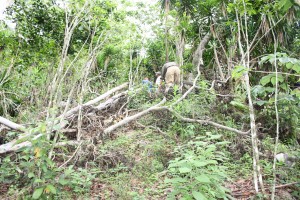 The coffee farm was in a really steep hill and everyone started to follow the land owner, an old man who climbed the hill like it was just a walk in the park. Me, oh my, after almost slipping the first time, I decided I should be one of the last and hopefully could hear what people were discussing from far. It was a naïve thought as everyone continue to go higher and higher. I probably had a terrible face, when someone said that I needed to go all the way up, because they would go back from another path. Being helped by two guys and after almost falling a thousand times, I finally made it to the top. I didn’t have time to recover my breath and appreciate the view as the conversation had already started when I got there. Going down was easier and I was impressed that I hiked the hill. But I was even more amazed by how everyone thought it was a normal thing to hike and sit in wet grass during a meeting.
The coffee farm was in a really steep hill and everyone started to follow the land owner, an old man who climbed the hill like it was just a walk in the park. Me, oh my, after almost slipping the first time, I decided I should be one of the last and hopefully could hear what people were discussing from far. It was a naïve thought as everyone continue to go higher and higher. I probably had a terrible face, when someone said that I needed to go all the way up, because they would go back from another path. Being helped by two guys and after almost falling a thousand times, I finally made it to the top. I didn’t have time to recover my breath and appreciate the view as the conversation had already started when I got there. Going down was easier and I was impressed that I hiked the hill. But I was even more amazed by how everyone thought it was a normal thing to hike and sit in wet grass during a meeting.
The next day we were told we would attend another meeting, an important one as donors and mayors would be present. And again was a “grassmeeting” in a preserved area. This time I didn’t have to overcome my lack of balance issues, as there was no hiking involved. On the other hand, I had to learn how to take notes while bugs were “attacking” me, including the biggest ants I’ve ever seen. Another fun “grassmeeting” experience. Attending formal and comfortable meetings will no longer be the same for me, the lack of adventure will probably make me miss the La Paz’ “grassmeetings”.
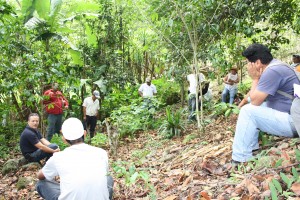
The Peace Peach
Posted by Tayná Morais in Tayna Martins on June 8, 2015
On our first round of interviews, we went to San Juan a village in the Department of Intibucá. We heard so many interesting stories. But there is one that I would like to share with you.
On our way back to the village, after visiting the micro-watershed called Agua Negra, we stopped at a small farm. The family lived in a modest house. Carlos, who works for COCEPRADII- Comite Central Pro-Agua y Desarrollo Integral de Intibucá, a local partner of CRS -, that was accompanying us asked if we would like some peaches. After hiking to the watershed, having some fruit was just what I needed. The peach was delicious and we grab them directly from the trees. He said that it was the melocotón de la amistad (friendship peach).
And here is the reason behind it. When the water system was being built, the farmer was quite unhappy about the “ intruders” in the mountain he had been living on for years. Like him, other families were unsatisfied with the lack of consideration about their concerns, which could turn out to be an obstacle to the project. So in one of the meetings between COCEPRADII, community leaders and the families living nearby the watershed, the owner of the small farm talked about his dream of planting peaches. However, he didn’t have the resources and means to buy the peach trees.
COCEPRADII’s members realized that this could be an opportunity to create a relationship that could overcome potential tensions. So they bought peach trees and gave it to the farmer as a sign of respect and basis for a friendship. This attitude worked pretty well. The farmer was so thankful that in the first peach harvest he searched for Carlos with a pack full of peaches as a gesture of gratitude.
A tale of connections and first impressions
Posted by Tayná Morais in Tayna Martins on June 6, 2015
Back in April, when I received the letter confirming I would be one of the Peacebuilders Fellows in Honduras I was so excited about the adventures awaiting in Honduras. So much crossed my mind. I would finally get to know more about Central America, a region quite close to Brazil, but for some reason not studied much in my home country.
And then the date came to pack everything in my room at a student residence in Geneva and fly to Brazil, but with a long connection in London. After many hours traveling, I was finally home, meeting my family and friends and eating the food I’ve missed so much. Just two days later it was time to fly again, now to a country I’ve never been, Colombia. I got there on a Sunday evening and was impressed with all the super cute dogs at the airport, searching for drugs. I went straight to a hotel near the airport, as the next day I would fly to el Salvador and from there to Honduras. Unfortunately, I couldn’t see much of Bogota, but the hours waiting at the airport – a big and modern one, way better organized than many airports in brazil – made me realize that everyone was quite used to the dogs and armed guards walking around.
The flight to El Salvador was not that long, but still they served a proper lunch and drinks, which nowadays you have to pay for if you’re traveling with a Brazilian company in a “short” trip like that. My flight to Honduras would leave 30 minutes after I landed in Salvador, so I was quite worried of missing the flight. But, surprise surprise, not only was the Salvadorian airport small, but my next gate was just in front the one I arrived. Waiting for the departure, I finally met Christine, the other fellow, in person. We chatted for awhile and got on the plane that would take us to our new and short peacebuilders’ life.
Time to land in Honduras. One afraid of flying should think twice before traveling to the airport in Tegucigalpa. The airstrip is so short, that the pilot has to brake super fast, a little bit of adrenaline to start my Honduran experience. After all these connections, passing through 5 countries before arriving in Honduras, at the immigration, I came to realize some misconceptions I had about the country. As much of the information I read before coming always highlighted the negative aspects of the country – violence, corruption, poverty – I was expecting a disorganized immigration process. But what I came across was a modern and well prepared system.
At the arrival, one of the staff of CRS was already waiting for us. The best first impression one can have of Honduran hospitality! We spent our first two nights in Tegucigalpa. Many things impressed me. For instance, the traffic was crazy! Even though I have had a drivers license for 8 years, I definitely would not be brave enough to drive in Tegus, as residents call it. The cars also kept my attention, the inequality is visible, most cars were either fancy SUV or really old cars. The disparity would also be in the houses, most of the houses near our hotel were big and well preserved, but on our way to the historical centre, we passed through a lot of poor houses, most of them on the hill. Another thing that impressed me is how in many stores, even the ones selling mattress, there would be a armed guard. Coming from a country permeated with urban violence, I thought I would feel a little bit like “home”, but the amount of armed guards was a constant reminder of how unsafe Tegucigalpa can be. Having said that, is important to highlight that I didn’t see any violent activity while I was there.
Moreover, for some reason, the electricity cables really kept my attention. Being born and raised in a planned city, Brasilia, where the vast majority of the electric cables are underground, seeing such a chaotic system, with cables all over, impressed me. I started to wonder if the water system would be better organized and got even more excited to learn about the water management and the water conflict in Honduras. Topic for another post.

